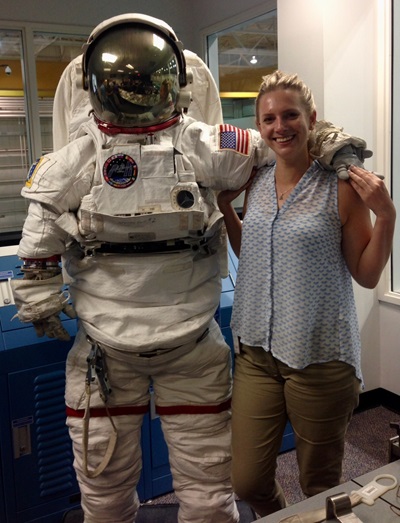2025 | Volume 26 | Issue 2

Dr Lisa Brown with an astronaut
Dr Lisa Brown’s feet are firmly on the ground as a general and hepatobiliary surgeon, but she reaches for the stars in her role at the forefront of aerospace medicine research.
The Melbourne-based surgeon researches the effects of space travel on human physiology and how mitigation strategies can be used to reduce their harmful impacts.
The information gained through this space medicine research can also offer valuable insights into health conditions on earth.
Dr Brown was born and educated in Aotearoa New Zealand before she found a way to combine her interest in science, and physics in particular, with medicine.
“I was always interested in sciences but the thing that I’ve always been most interested in was physics, and particularly astrophysics,” she says.
“Through medical school I was thinking about how I could merge the two and so I did some aviation medicine training.”
Dr Brown travelled to Oxford University in the UK to study space medicine, completing a research project on hypoxia where she explored how lower oxygen—like those experienced at high altitude levels—could make people fitter for surgery.
She became the first Kiwi to complete a training course in space medicine at the University of Texas Medical Branch and NASA in Houston, US.
“I enjoyed seeing mission control and meeting the astronauts—it was really exciting to do all of these things,” she says.
As a hepatobiliary surgeon, Dr Brown is particularly interested in hepatobiliary conditions in space.
“There are so many things that you can think of, like appendicitis, cholecystitis, diverticulitis, that can happen in space, and we need to work out how you can manage them.
“The research that I’ve done is thinking about that and how you might manage these conditions early with treatments like antibiotics. If that doesn’t work, what would be the next step in terms of management.”
Alongside her research and surgical role at the Royal Melbourne Hospital and Peter MacCallum Cancer Centre, Dr Brown supervises a medical student who is studying how to use knowledge from space to manage illness on earth.
The research focuses on the high incidence of skin cancer among astronauts due to ionizing radiation in space. It also examines the increased rates of melanoma in Australia and Aotearoa New Zealand compared to other countries.
“We’re looking at the origins of these skin cancers, where the crossovers are and ultimately how that knowledge could be used to reduce the incidence of skin cancer.”
In 2024 Dr Brown established the University of Auckland-based New Zealand Space Health Research Network with Professor Anthony Phillips. This showcases her work and that of other Aotearoa New Zealand researchers to an international audience.
The group also aims to identify health research that could have space applications, offering benefits to both terrestrial and space medicine.
Heart conditions are just one of the instances where space medicine can help find solutions for terrestrial problems, due to the impact of high altitudes on blood pressure and fluids, and their role in cardiomyopathy.
When Dr Brown entered the field of space medicine two decades ago, there were few women involved, and while it is improving, the gender balance remains pronounced. However, she benefited from supportive mentors.
This support from colleagues has been crucial since becoming a mother to a five-year-old daughter and three-month-old son.
Dr Brown also nurtures the female leaders of the future by volunteering as a mentor with the United Nations Space for Women Network.
In March, she was one of only 30 people invited to a Space Surgery Symposium in Houston, where she delivered a presentation on space medicine.
Despite her interest in this field, Dr Brown is not keen to travel far into space herself.
“I think it would be really cool to go to the moon, but I don't know if I'd want to go much further than that, because it’s quite a confined and isolated environment,” she says.
“I never had a dream to be an astronaut as a kid, it was more that I was really interested in how the universe worked.
“My grandfather was a jet fighter pilot, and he used to talk a lot about flying and his experience. I always looked up to him, and that influenced me as well.”
Despite the challenge of juggling motherhood with her career at the forefront of space medicine, Dr Brown says she loves the teamwork of surgery, the rewards of mentoring and the opportunity to innovate through her research.